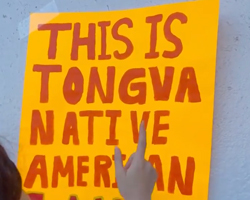

by Mariana Ramirez
November 20, 2023
During the summer of 2023 the UCI History Project held several Ethnic Studies professional development programs for teachers throughout the southern California region. These sessions all focused on learning from and with local community experts and scholars with the goal of having teacher participants develop Ethnic Studies curriculum. One of those professional learning sessions was titled, “Relational Stories of Solidarity in Southern California.” Thus, our teacher selection was centered on teachers who grew up in Orange County or teachers who currently teach in Orange County. For this session on solidarity, teachers who applied to this series and were accepted to the program gathered for two days at the Orange County and Southeast Asian Archive at UCI, where they were guided by Dr. Krystall Tribbett, lead curator for Orange County Regional History, to explore local primary sources from documents, newspapers, posters, photographs. Teacher’s also got to learn from Kaaryn Gustafson, Professor at UCI Irvine School of Law and Co-Director of the UCI Law Center on Law, Equality and Race, and her approach to teaching about race, ethnicity, and social change in California. Dr. Bryant Partida, visiting scholar at Center for Critical Race Studies at UCLA and visiting Assistant Professor at Loyola Marymount, also led a talk around bridging archives and Ethnic Studies. As part of the series, we also explored how solidarity is a concept that is central to Ethnic Studies curriculum and pedagogy. For this solidarity series, we explored the concept of solidarity from the perspective of Black Feminist scholar, bell hooks, as described in the following passage “Solidarity is not the same as support. To experience solidarity, we must have a community of interests, shared beliefs and goals around which to unite, to build Sisterhood. Support can be occasional. It can be given and just as easily withdrawn. Solidarity requires sustained, ongoing commitment (2000, p. 67).
Since the summer, teachers who engaged in this program have been working on developing inquiry-based Ethnic Studies lessons that they are either integrating in their core classes or within their Ethnic Studies course. For instance, History and Ethnic Studies teacher Wesley Perez, who grew up in Orange County and is now teaching at La Puente High School, developed a unit on Indigenous Solidarity. For this unit, students learned about the different ways indigenous people, including women and children, have resisted colonialism. They also learned about the histories of the Tongva peoples, whose lands include Los Angeles and Orange County, and how their high school is located on Tongva sacred grounds. For the final unit project, students created a variety of installation art projects around the school yard, including chalk art, posters, and models that exemplified a focus on the history of Indigenous peoples. Each installation had QR codes that led viewers to the research that students developed as part of this work. Some students also had the option to engage in a silent protest as a way of embodying their solidarity with indigenous peoples. Other students created land acknowledgement statements and read them to their peers during lunch. One of the student projects titled, Missing & Murdered Indigenous Women, focused on creating awareness on the disproportionate rates of indigenous women whose lives and stories are truncated. For this project, students asked viewers to add a red handprint on the concrete to uplift the story and life of one the many indigenous women who are missing. To culminate the project students created video reflections on what they have learned about being in right relationship with the indigenous peoples whose lands we inhabit. We are looking forward to the Spring semester, where UCI History Project will host teachers part of this series in a curriculum fair.


Please stay tuned for details about UCI History Project upcoming Ethnic Studies professional learning series for K-12 educators.
____
Mariana E. Ramírez is the Associate Director for the UCI History Project, focused on building collaborative networks between ethnic studies scholars, K-12 teachers, and their students in a meaningful study of local history through an ethnic studies methodology and pedagogy. She worked as a middle and high school teacher in the immigrant communities of Barrio Logan in San Diego and Boyle Heights in Los Angeles for 13 years. An important part of her work is engaging with students in geospatial community action research projects and serving as an advisor for student social justice organizations. She is currently a doctoral candidate part of the UCLA School of Education and Information Studies in the Urban Schooling Division. Her research agenda lies at the intersections of ethnic studies pedagogy, critical geographies, and documenting local histories of joy and resistance of people of color via oral histories and archival research.
hooks, b. (2000). Feminist theory: From margin to center. London, UK: Pluto Press.
“Solidarity is not the same as support. To experience solidarity, we must have a community of interests, shared beliefs and goals around which to unite, to build Sisterhood. Support can be occasional. It can be given and just as easily withdrawn. Solidarity requires sustained, ongoing commitment. (p. 67)
